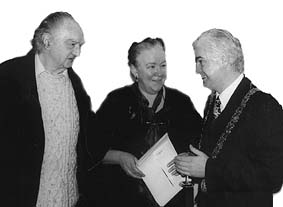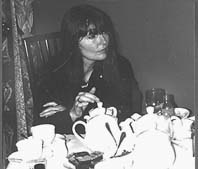|
 The Perfect Bar of Soap The Perfect Bar of Soap
Whenever Pilate travelled on horseback
To foreign parts
He always carried in his saddle-bag
The perfect bar of soap-
And you could say
That he was simply preparing
For the inevitable.
But
Whether Pilate knew
What the inevitable was
Or where it would take place
Is another matter-
And where he obtained the soap Patrick Galvin, poet and chairperson of the MLC, and
Has always been a mystery. Mary Johnson, Artistic Director, with the Lord Mayor,of
Cork, Rght. Hon. Cllr Joe O'Flynn, at Éigse na gCúige
Recent discoveries,
However,
Have shown quite clearly
That the soap was a product
Of the only factory in Rome
To have paid its workers
At a very high rate.
It is not surprising
Therefore
That when Pilate washed his hands
Of the Jew
He walked away
Clean
As a whistle. Patrick Galvin
The seasons of Christmas and Easter have gone by since The Munster Literature Centre last produced a Newsletter Plus. The war rages in Kosovo, millenium ideas clutter the economy and writers and other artists still struggle hard to survive in a society that doesn't really believe in what they do. The Arts Plan has thrust consultation after consultation upon us, and report after report after report. At the last count, artists were being advised to bring yet more bureaucracy upon themselves. Soon they will not have time to come up with a creative idea to work on. One hears the comment 'The last plan was too idealistic'. Does that mean that it articulated dreams instead of realities? Is not a dream a potential reality? When a footballer, aged twenty, receives £6,000 per week to practice and play a match once or twice a week at high season, this is a reality. When it is proposed that our supremely gifted writers and other artists might be income-proofed to that level for one year's work then is that a dream or a potential reality? It is no dream to lift up a newspaper and see that the price of a house is somewhere around £100,000; for an artist whose need for a reasonable shelter is the same as other people's, this is a nightmare. Throughout the centuries, houses have come and gone, the soul of man and woman has remained etched in beautifully illustrated documents, frescoes, triptychs, sculptures, poetry, music and other artistic pursuits that interpret and try to make sense of our reality. Without these we could not survive. We now listen to statements, enunciated in Pilate fashion, recommending that it is up to the sector to help itself. Who makes up the sector?
 At the Munster Literature Centre the need for affirmation and the celebration of literature found its outlet in Éigse na gCúige Connacht/Munster literary festival. Celebrated at the beginning of the Celtic year it brought together many of the finest practitioners in Ireland's literary world. Poetry, prose, writing for the theatre, for film, for children, translating literary texts, writing for self expression and recreation, storytelling, songwriting and music making; all these art forms were aired and explored, sometimes to the few but certainly highly appreciative audiences. At the Munster Literature Centre the need for affirmation and the celebration of literature found its outlet in Éigse na gCúige Connacht/Munster literary festival. Celebrated at the beginning of the Celtic year it brought together many of the finest practitioners in Ireland's literary world. Poetry, prose, writing for the theatre, for film, for children, translating literary texts, writing for self expression and recreation, storytelling, songwriting and music making; all these art forms were aired and explored, sometimes to the few but certainly highly appreciative audiences.
Michael D. Higgins, in his challenging and very eloquent opening address, reflected on the fluctuating state of
Eva Bourke, Poet, at Éigse na gCúige language and communication. We have been subjected to
the tyranny of the soundbyte and the language of the bureaucrat and the eurocrat. Not so, Michael D. With him we visited every secret place where language lives, and we were all the more replenished for it. That set the tone for the festival. Over the next four days we were to become anaesthetized from the outside world as we escaped into the exploration of the language of communication at the level of the soul. In this edition of Newsletter Plus you will savour that richness. Writers travelled from Mayo, Sligo, Galway, Leitrim and Dublin to share their talent with us and with the writers of Munster. We thank all the writers (named on page 16) and also Sinéad Mac Aodha of The Arts Council who has always given her support to the festival, both in her encouragement to establish it and in her presence at and appraisal of the festival.
The Mexican Ambassador to Ireland, Daniel Dultzin, whose work on the cultural scene in Ireland is becoming legendary, closed the Festival. He supported our request for an Irish Ambassador to Mexico, he also suggested that Cork should twin with a Mexican city and he then promised to present the Centre and the people of Munster with Trece Poetas del Mundo Azteca. This is the work of 13 native Mexican Nahuatl poets, written in their pre-Colombian language, the text is then translated into Spanish, into English and illustrated with lithographs by two well known contemporary Mexican artists. This set of 52 framed works will officially be presented to the Centre in July, and as much of it as possible will be on exhibition in the Boole Library Foyer during the months of July and August. Daniel Dultzin chose a strong text of Octavio Paz's to sum up the essence of the Festival:
"..............poetic activity is rediscovering all its ancient subversive powers by this very secrecy impregnated with eroticism and the occult, a challenge to an interdict not less condemnatory for not being explicitly formulated. Poetry which yesterday was required to breathe the free air of universal communion, continues to be an exorcism for preserving us from the sorcery of force and of numbers. It has been said that poetry is one of the means by which modern man (and woman, my words) can say No to all these powers, which, not content with disposing of our lives, also want to rule our consciences, but this negation carries with it a Yes which is greater than itself."
From the introduction to An Anthology of Mexican Poetry selected by Octavio Paz and translated by Samuel Beckett.
|
